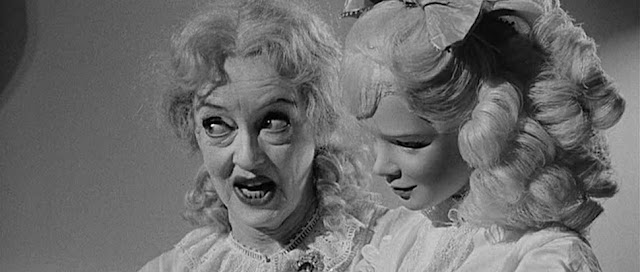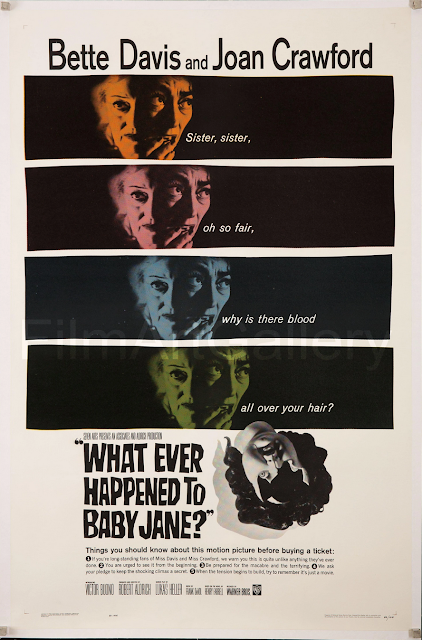 Shattered lives and slowly-simmering hatred make for a heady, personal cocktail of psychological horror.
Shattered lives and slowly-simmering hatred make for a heady, personal cocktail of psychological horror.
After Alfred Hitchcok's landmark PSYCHO (1960) blew open the doors for disturbing psychological horror in American cinema, it was only a matter of time before another work would happen along to creep out the public without the benefit of monsters or the supernatural. That work was Robert Aldritch's WHAT EVER HAPPENED TO BABY JANE?, the grand dame of what was soon to become known as "hag horror," a genre whose foundation was laid with this black-and-white shocker.
In 1917, nauseating, bratty child vaudeville star "Baby" Jane Hudson rakes in the cash for her family with her treacly stage antics, while her parents ignore her sister, Blanche, who also suffers the obnoxious treatment of the pint-sized diva. By 1935, both sisters have careers in the movies, but the spotlight has now shifted to Blanche, who is a genuine talent, while Jane fails to electrify onscreen, but Blanche's contract insists on work for Jane, so the studio is stuck with her. But on a night after a studio party, the sisters, who share a residence, drive home and one of them gets out of their car to open their home's front gate. Both women's features are obscured by shadow, so we do not know who is doing what, but the one behind the wheel pops the clutch and floors it in an attempt to kill her sister...
The
calendar skips ahead by 33 years to the present day of 1962, and the
Hudson sisters still live together, only now Blanche is confined to a
wheelchair after the crash rendered her an invalid — the crash being
blamed on Jane — and she now totally relies on her sister for her care.
That said, Blanche is kept isolated from the outside world, basically a
prisoner in the house, and even its windows are barred to drive that
point home. Jane, meanwhile, is now a grotesque alcoholic whose
around-the-house look is an unconscious creepy caricature of her stage
persona from her long-ago glory days. The boozy Jane never lets her
sister forget that her money from her childhood career took care of the
family and paid for the house, but Blanche seeks to sell the house and
have Jane, who is now quite psychotic and out of her mind and only
growing worse every day, put away in a mental hospital. Once Jane gets
wind of this, she wages cruel physical and psychological warfare upon
her helpless sister, and even the occasional presence of a housekeeper, a
nosy neighbor who's a fan of Blanche's old movies, and a would-be
musical partner for Jane do not get in the way of Jane's unhinged
cruelty. As the household descends into utter madness, Jane becomes more
calculated and diabolical, with matters spiraling to a shocking and
tragic conclusion...
Sisterly... Well, it sure as hell ain't love.
That's
as far as I'll go by way of recap, as the events of this story are best
approached with only the basic setup in mind. It's a study of madness,
staggering family dysfunction, cruelty, and the slow-burn of
alcohol-fueled insanity, and as such it works beautifully. Crawford and
Davis, then middle-aged and well past their more bankable days as
classic hotties, both play their parts with the expected excellence,
especially Davis, who steals the film in an Oscar-nominated performance
as Jane. She shuffles around the house in the most from my manner
possible, her face garishly made up in what looks like a deranged
child's idea of glamor, and her blonde hair sometimes done in the manner
of her days as a curly-haired cutie.
Bette Davis as Jane Hudson. Nothing disturbing going on here. Nope. Nosiree...
I'll
just leave it at that, other than to state the final reveal is well and
truly fucked-up, and to give this a strong recommendation. The two
subsequent major hag horror classics, STRAIT-JACKET and
HUSH, HUSH, SWEET CHARLOTTE
(both 1964 and starring Joan Crawford and Bette Davis, respectively)
are both quite good and a lot of fun (especially CHARLOTTE, its
over-length notwithstanding), but if you're going to explore this
sub-genre, one is advised to start where it truly began.



No comments:
Post a Comment